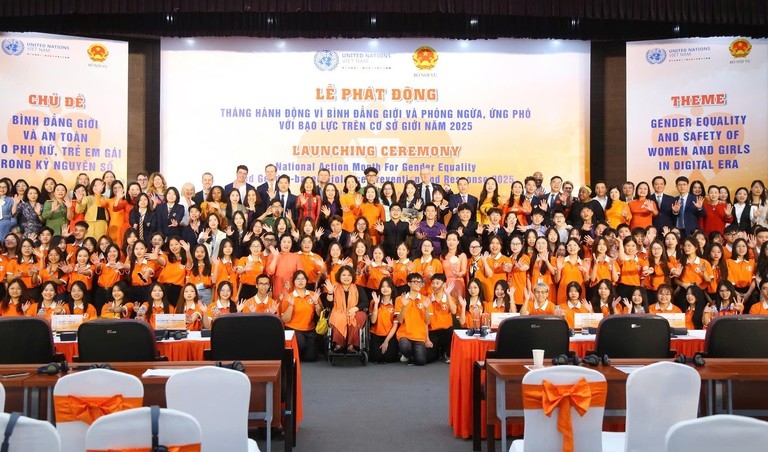Vietnam launches Action Month for women’s and girls’ safety in digital era
VOV.VN - The Ministry of Home Affairs, in coordination with the United Nations Entity for Gender Equality and the Empowerment of Women (UN Women) on November 11 launched the National Action Month for Gender Equality and Gender-Based Violence Prevention and Response 2025 under the theme “Gender equality and safety for women and girls in the digital era.”

The event was attended by Deputy Minister of Home Affairs Nguyen Thi Ha, Standing Vice Chair of the National Committee for the Advancement of Women in Vietnam, UN Resident Coordinator in Vietnam Pauline Tamesis, and more than 400 delegates representing ministries, government agencies, UN organizations, embassies, NGOs, and research institutions.
Deputy Minister Nguyen Thi Ha emphasized that gender equality is not only a goal but also a key driver of sustainable socio-economic development. Over the years, Vietnam has recognized gender equality as a critical political task, reflected in its legal and policy framework to promote equality, empower women, and ensure individual rights in society.
Vietnam’s achievements in gender equality have been acknowledged internationally. The country ranks among the leading nations in the region in narrowing the gender gap. According to the Global Governance and Gender Index, Vietnam ranked 39th out of 158 countries in 2024, up 32 places from 2022.
Women now make up 30.26% of the National Assembly, above regional and global averages, and more Vietnamese women entrepreneurs and executives are recognized by the World Economic Forum. Gender equality and women’s empowerment are among the three Millennium Development Goals Vietnam has achieved.
Ha highlighted that in the context of rapid digital transformation, the National Resolution No. 57 on breakthrough development in science, technology, innovation, and digital transformation identifies these areas as key drivers for sustainable socio-economic growth and enhancing national competitiveness. This provides an opportunity for agencies, organizations, businesses, and citizens to engage, adapt, and benefit from digital transformation in skills, awareness, behaviors, and lifestyles.

However, alongside these opportunities, challenges persist. Gender-based risks in the digital space include stereotypes, online violence such as scams, grooming, verbal harassment, insults, sharing of sensitive images or videos, blackmail, and online abduction. These threats are increasingly sophisticated, difficult to control, and disproportionately affect women and girls.
Research by the former Ministry of Labor, Invalids and Social Affairs in 2021 found that among 12–17-year-olds using the internet, 87% go online daily but only 36% know how to protect their personal information.
Against this backdrop, the 2025 Action Month emphasizes the importance of cross-sectoral coordination in promoting gender equality, preventing and responding to gender-based violence in the digital era.
Deputy Minister Ha called on government agencies at all levels and international organizations to continue providing technical support, launching activities to raise awareness and action on gender equality, and promoting online safety for women and girls. Media organizations are encouraged to disseminate positive messages highlighting the role and status of women and girls.
“Men and boys should be the most informed and reliable companions in achieving gender equality with women and girls, helping build a safe and civilized environment,” she added.
According to UN Resident Coordinator Pauline Tamesis, studies show that 16–58% of women and girls have experienced online violence. One in four children using the internet in Vietnam inadvertently encountered sexual content in the past year, 14% sought it actively, nearly 2% of older adolescents were asked for money or gifts in exchange for sharing sensitive images, and 1% had personal images shared without consent. She stressed that online child sexual abuse and digital gender-based violence are part of a longer chain of harm requiring systemic accountability.
“When Vietnam advances toward becoming a high-income country by 2045, digital transformation must be inclusive, safe, and empowering for all, particularly women and girls,” Tamesis said.
She underlined the need to integrate gender into digital policies and strategies, close the digital skills gap, equip women and girls with knowledge to participate confidently online, invest in digital education and training for remote and vulnerable communities, encourage girls in STEM education and careers, and work with the private sector to expand opportunities for women in leadership and tech entrepreneurship.
She added that multi-sector cooperation between the government, UN agencies, schools, and the private sector is essential to create a safe digital ecosystem.
Vietnam is actively pursuing this goal, with the UN ready to act as a partner, connector, and advocate to help realize a digital future that ensures safety, equality, and dignity for all, Tamesis concluded.



